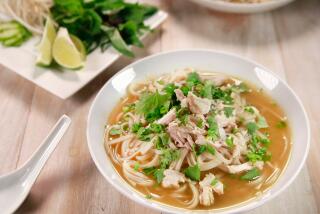Analysis finds echinacea effective
- Share via
The herbal remedy echinacea can prevent colds and speed recovery from runny noses, coughs and other symptoms, according to a study published Sunday that could renew interest in the discredited product.
The analysis of 1,600 patients pooled from 14 previously published studies found that echinacea reduced the chances of catching a cold by 58% and shaved 1.4 days off the duration of a cold, researchers said.
But the findings in the journal Lancet Infectious Diseases ran counter to results from recent head-to-head studies showing echinacea had no effect.
Dr. Wallace Sampson, editor of the Scientific Review of Alternative Medicine and an emeritus adjunct professor of medicine at Stanford University School of Medicine, said the methodologies of some of the studies used in the analysis were suspect, casting doubt on the pooled result.
Dr. Ronald B. Turner, a professor of pediatrics at the University of Virginia, who has studied echinacea in the past, called the report “a rehash of old data.”
“It is a new interpretation, that’s for sure, but I would rather see new data,” he said.
Craig Coleman, an assistant professor of pharmacy practice at the University of Connecticut and lead author of the latest study, said none of the previous trials were large enough to detect echinacea’s benefits.
Only when he and colleagues at the University of Connecticut and Hartford Hospital in Hartford, Conn., pooled data from all 14 studies did the herb’s benefits emerge, he said.
Coleman said he felt good about the quality of the studies used in his analysis.
He said his analysis, though not definitive, suggested that echinacea was worthy of further research.
“At the least it should be brought back to the table as a potential drug that could be studied to prevent the common cold,” he said.
Coleman said his analysis showed that echinacea was less effective against rhinovirus than other cold viruses, a shortcoming that could limit the herb’s usefulness because rhinovirus is the most common cold virus.
When used to ward off illness, adults taking echinacea got one to two colds a year, instead of the typical two to four colds, the study found.
Taken as a remedy, echinacea reduced the average length of colds to four to six days, from five to seven days, researchers said.
Coleman cautioned that the safety of echinacea hadn’t been adequately studied and that no one should take the herb without first checking with a doctor. He said it was possible that it could interfere with some prescription drugs.
Echinacea, a member of the same plant family as the daisy, has been used in the United States as an herbal cold remedy since the 1960s. The World Health Organization recognized echinacea as a cold treatment in 1999.
But Americans reduced spending on echinacea products by 16% last year, disillusioned about the herb’s efficacy.
Sales of echinacea products, including tablets, capsules, tea bags and lozenges, fell to about $129 million in 2006, according to the Nutrition Business Journal, an industry publication in San Diego.





